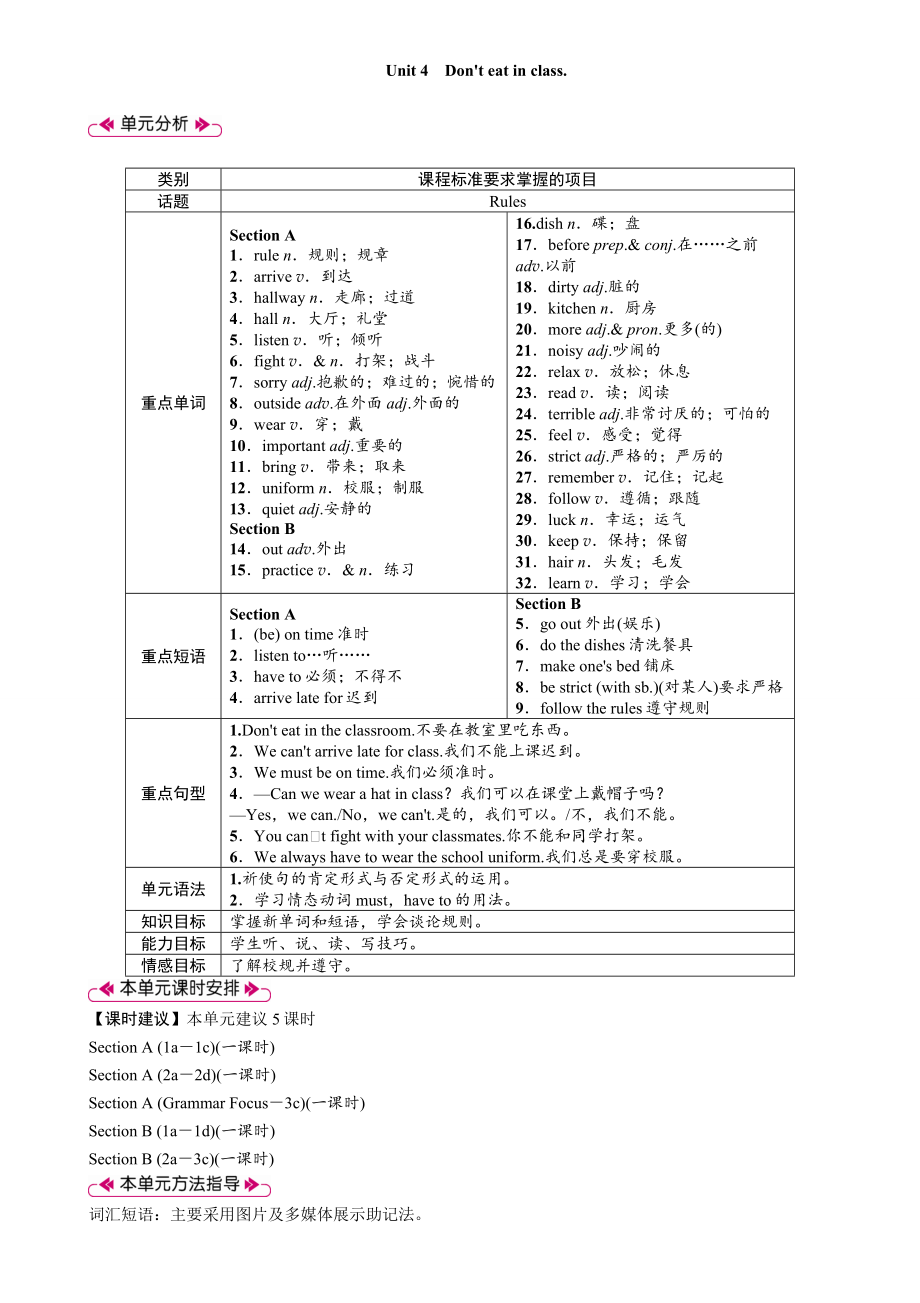《Unit 4 Don't eat in class-Section A(1a=2d)教案》由會(huì)員分享�����,可在線閱讀�����,更多相關(guān)《Unit 4 Don't eat in class-Section A(1a=2d)教案(3頁珍藏版)》請(qǐng)?jiān)谘b配圖網(wǎng)上搜索�����。
1�����、Unit 4 Don't eat in class.
類別
課程標(biāo)準(zhǔn)要求掌握的項(xiàng)目
話題
Rules
重點(diǎn)單詞
Section A
1.rule n.規(guī)則�����;規(guī)章
2.a(chǎn)rrive v.到達(dá)
3.hallway n.走廊�����;過道
4.hall n.大廳�����;禮堂
5.listen v.聽�����;傾聽
6.fight v.& n.打架;戰(zhàn)斗
7.sorry adj.抱歉的�����;難過的�����;惋惜的
8.outside adv.在外面 adj.外面的
9.wear v.穿�����;戴
10.important adj.重要的
11.bring v.帶來�����;取來
12.uniform
2�����、n.校服�����;制服
13.quiet adj.安靜的
Section B
14.out adv.外出
15.practice v.& n.練習(xí)
16.dish n.碟�����;盤
17.before prep.& conj.在……之前 adv.以前
18.dirty adj.臟的
19.kitchen n.廚房
20.more adj.& pron.更多(的)
21.noisy adj.吵鬧的
22.relax v.放松�����;休息
23.read v.讀�����;閱讀
24.terrible adj.非常討厭的�����;可怕的
25.feel v.感受�����;覺得
26.strict adj.嚴(yán)格的�����;
3�����、嚴(yán)厲的
27.remember v.記住�����;記起
28.follow v.遵循�����;跟隨
29.luck n.幸運(yùn)�����;運(yùn)氣
30.keep v.保持�����;保留
31.hair n.頭發(fā)�����;毛發(fā)
32.learn v.學(xué)習(xí)�����;學(xué)會(huì)
重點(diǎn)短語
Section A
1.(be) on time準(zhǔn)時(shí)
2.listen to…聽……
3.have to必須;不得不
4.a(chǎn)rrive late for遲到
Section B
5.go out外出(娛樂)
6.do the dishes清洗餐具
7.make one's bed鋪床
8.be strict (with sb.)(對(duì)某人)
4�����、要求嚴(yán)格
9.follow the rules遵守規(guī)則
重點(diǎn)句型
1.Don't eat in the classroom.不要在教室里吃東西�����。
2.We can't arrive late for class.我們不能上課遲到�����。
3.We must be on time.我們必須準(zhǔn)時(shí)�����。
4.—Can we wear a hat in class�����?我們可以在課堂上戴帽子嗎�����?
—Yes�����,we can./No�����,we can't.是的�����,我們可以�����。/不�����,我們不能�����。
5.You cant fight with your classmates.你不能和同學(xué)打架�����。
6.We always
5、 have to wear the school uniform.我們總是要穿校服�����。
單元語法
1.祈使句的肯定形式與否定形式的運(yùn)用�����。
2.學(xué)習(xí)情態(tài)動(dòng)詞must�����,have to的用法�����。
知識(shí)目標(biāo)
掌握新單詞和短語�����,學(xué)會(huì)談?wù)撘?guī)則�����。
能力目標(biāo)
學(xué)生聽�����、說�����、讀�����、寫技巧�����。
情感目標(biāo)
了解校規(guī)并遵守�����。
【課時(shí)建議】本單元建議5課時(shí)
Section A (1a-1c)(一課時(shí))
Section A (2a-2d)(一課時(shí))
Section A (Grammar Focus-3c)(一課時(shí))
Section B (1a-1d)(一課時(shí))
Section B (2a-3c)
6�����、(一課時(shí))
詞匯短語:主要采用圖片及多媒體展示助記法�����。
基本句子:采用多媒體展示及交際法(利用多媒體展示兩人進(jìn)行交際時(shí)的情景)。
語法:主要通過交際�����、練習(xí)讓學(xué)生掌握如何對(duì)規(guī)則進(jìn)行問答�����。
第一課時(shí) Section A (1a-1c)
主備內(nèi)容
Section A (1a-1c)
教學(xué)目標(biāo)
【知識(shí)目標(biāo)】
Important words:rule�����,arrive�����,hall�����,listen�����,fight�����,sorry
Important phrases:(be) on time�����,listen to…�����,arrive late for
Important sentences:
7�����、1.—What are the rules?
—Well�����,we can't arrive late for school.We must be on time.
2.Don't listen to music in class.
【能力目標(biāo)】訓(xùn)練學(xué)生的聽說技巧�����。
【情感目標(biāo)】培養(yǎng)學(xué)生遵守規(guī)則的意識(shí)�����。
教學(xué)重難點(diǎn)
重點(diǎn):1.本課時(shí)的關(guān)鍵詞匯。
2.本課時(shí)的目標(biāo)語言�����。
難點(diǎn):提高學(xué)生的聽�����、說技能�����。
教法學(xué)法
情景交際法�����,小組合作學(xué)習(xí)�����,聽說課的“3P”教學(xué)模式�����。
Step 1 自主學(xué)習(xí)
【新詞自查】
根據(jù)句意及首字母提示填寫單詞�����。
1.He is listen
8�����、ing__ to the news on radio.
2.There are too many rules__ in our school.
3.We can't eat in the classroom.We should eat in the dining hall__.
4.Tom often fights__ with his twin brother Tim.
5.The visitor will arrive__ at our city next Monday.
6.Don't run in the hallways__.
7.I'm sorry__ to hea
9�����、r that you are ill.
8.Don't arrive__ late.
Step 2 情景導(dǎo)入
【參考案例】
(Show the students the picture of fighting)
Teacher:Look at the two boys.What are they doing?
Students:They are fighting.
Teacher:Can we fight?
Students:No�����,we can't.
Teacher:What should we say to the boys?
Students:We should say
10�����、 to them:Don't fight.
設(shè)計(jì)意圖:通過圖片展示導(dǎo)入本課時(shí)的話題——規(guī)則�����。同時(shí)教育學(xué)生遵守學(xué)校�����、家庭、公共場(chǎng)所的規(guī)則�����,做一個(gè)文明的中學(xué)生�����。
Step 3 完成教材1a-1c的任務(wù)
【操作案例】
1.學(xué)習(xí)1a中的學(xué)校規(guī)則�����,大聲朗讀這些規(guī)則�����,然后將這些規(guī)則的序號(hào)填在相對(duì)應(yīng)的人物旁邊�����。
2.認(rèn)真聽錄音�����,找出Peter�����、Amy和Mike違反了哪些規(guī)則�����,在1b中的橫線上寫出1a中的數(shù)字�����,師生共同核對(duì)答案�����。
3.再聽一遍錄音�����,同時(shí)跟讀�����。
4.練習(xí)1c中的對(duì)話�����。然后編寫新對(duì)話,小組內(nèi)進(jìn)行對(duì)話練習(xí)�����,并進(jìn)行組與組之間的比賽�����,教師點(diǎn)評(píng)�����。
設(shè)計(jì)意圖:聽說結(jié)合�����,第一時(shí)間向?qū)W生傳達(dá)
11�����、語言目標(biāo)�����,通過結(jié)對(duì)對(duì)話練習(xí),學(xué)生可以熟練掌握祈使句�����。
知識(shí)點(diǎn)撥
1.a(chǎn)rrive的用法
(1)你每周什么時(shí)候到達(dá)上海�����?When do you arrive in Shanghai every week?
(2)當(dāng)我到達(dá)上海育才中學(xué)時(shí)�����,是七點(diǎn)五十�����。When I arrive at Yucai Middle School in Shanghai�����,it is7:50.
(3)到達(dá)這兒之后�����,我開始上課�����。After I arrive here�����,I begin my class.
arrive意為“到達(dá)”�����,是一個(gè)不及物動(dòng)詞�����,不能直接跟表示地點(diǎn)的名詞�����。如果要跟名詞�����,就必須加介詞in或at�����。在
12、“大地方”前加in�����,在“小地方”前加at�����。如果arrive后是地點(diǎn)副詞�����,就不用介詞�����。我們學(xué)過的“到達(dá)”的另一種表達(dá)法是get to�����。
2.be late for的用法
下周開會(huì)別遲到�����。Don't be late for the meeting next week.
be late for sth.意為“做某事遲到”�����,其同義詞組為do sth.late�����。
Step 4 板書設(shè)計(jì)
Section A (1a-1c)
Important words:rule�����,arrive�����,hall�����,listen�����,fight�����,sorry
Important phrases:(be) on time,listen to…�����,arrive late for
Important sentences:
1.—What are the rules?
—Well�����,we can't arrive late for school.We must be on time.
2.Don't listen to music in class.
本課時(shí)通過圖片展示�����,師生對(duì)話的形式引出新知識(shí)�����,通過結(jié)對(duì)對(duì)話練習(xí)�����、小組比賽等活動(dòng)�����,強(qiáng)化語言目標(biāo)�����,提高課堂教學(xué)效率�����。
 Unit 4 Don't eat in class-Section A(1a=2d)教案
Unit 4 Don't eat in class-Section A(1a=2d)教案

